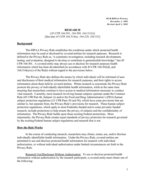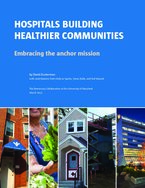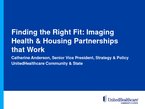Found 29 resources.
0
0
0
The Children’s Partnership’s newly released policy brief, “Uplifting the Power of Culture: Protective Factors for the Health of California’s Children,” emphasizes how culturally grounded protective factors in early childhood can create equitable pathways to health and success for BIPOC children. By centering these factors in early childhood programs, California can help ensure that all children—especially those from marginalized communities—have the support they need to thrive. Access the brief here.
Topics: Child welfare, Data sharing, Research
 Shared by Housing Is
on Jan 29, 2025
Shared by Housing Is
on Jan 29, 2025 0
0
0
The Help Me Grow National Center (HMG) conducted a year-long Goal Concordant Care Study to explore how aligning early childhood system support with families’ goals can not only prevent negative outcomes for young children, but also help them thrive. HMG Orange County, California was one of three HMG systems in the study that tested the impact of integrating motivational interviewing as a strategy to elicit, document and share parent’s goals as a systematic enhancement to their HMG Centralized Access Point work. In this new blog post, HMG Orange County provides an inside look at their...
Topics: Advocacy, Data sharing, Research
 Shared by Housing Is
on Jan 29, 2025
Shared by Housing Is
on Jan 29, 2025 0
0
0
A fact sheet from the National Partnership for Women & Families, “Paid Leave Means A Stronger Nation,” reports that most working people in the United States–73 percent, or 106 million people nationwide–do not have paid family leave through their jobs. Just 14 states have their own paid family and medical leave programs. For working people everywhere else, the lack of paid leave exacerbates other economic and care challenges to public health and our economy including the rising cost of living and a scarcity of reproductive and maternal healthcare. The report highlights that if women...
Topics: Data sharing, Research
 Shared by Housing Is
on Jan 29, 2025
Shared by Housing Is
on Jan 29, 2025 0
0
0
The Vancouver Housing Authority collaborated with a Federally Qualified Health Center and a homeless crisis response system to develop a network of scattered-site and site-based supportive housing. This moderated discussion will cover how VHA paired Housing Choice Vouchers and public housing with a Medicaid-funded supportive housing benefit to serve people identified by the community’s Coordinated Entry as needing supportive housing. Speakers will also discuss the challenges faced through the process, model adjustments made, and evaluation of the work through matching housing data and...
Topics: Advocacy, CLPHA, Data sharing, Family engagement, Health, Healthy homes, Homelessness, Housing, Legislation & Policy, Low-income, Research, Stability, Sustainability
 Shared by Karina George
on Jun 17, 2022
Shared by Karina George
on Jun 17, 2022 0
0
0
This session will review the extent to which local jurisdictions engaged with school districts in the 2016-17 Affirmatively Furthering Fair Housing (AFFH) process and preview the potential for PHAs to engage with school districts and school data in the upcoming renewal of the HUD AFFH process.
Topics: Advocacy, Attendance, CLPHA, Data sharing, Education, Family engagement, Housing, Legislation & Policy, Research, Sustainability
 Shared by Karina George
on Jun 17, 2022
Shared by Karina George
on Jun 17, 2022 0
0
0
The articles below are part of a special collection commemorating 25 years of the Health Care System Research Network’s (HCSRN's) rigorous research to improve health outcomes and health systems’ performance by leveraging electronic health data. This new collection highlights, among other things, advances in personalized cancer care, the optimal use of AI in health care, and the evolution of common data models, featuring work from Kaiser Permanente, Intermountain Healthcare and others.
Topics: Data sharing, Health, Partnerships, Research
 Shared by Housing Is
on Jun 13, 2019
Shared by Housing Is
on Jun 13, 2019 0
0
0
This environmental scan, conducted by AcademyHealth with support from the Kresge Foundation, provides an overview of the technology behind emerging multi-sector initiatives to address social determinants of health.
Topics: Community development, Data sharing, Health, Partnerships, Research
 Shared by Housing Is
on May 2, 2019
Shared by Housing Is
on May 2, 2019 0
0
0
The PHNCI Innovation Learning Community grantees spent eighteen months hard at work implementing innovations in their communities. From this community, we have been able to learn what makes an innovation work and be replicable, including leadership buy-in, cross-sector partnerships, and community engagement. In addition to learning about innovation broadly from these grantees, we also want to highlight each grantee’s individual work, including success, challenges, and lessons learned for others who may be interested in replicating their work. The case studies below, produced by NORC at the...
Topics: Data sharing, Health, Partnerships, Research
 Shared by Housing Is
on Apr 8, 2019
Shared by Housing Is
on Apr 8, 2019 0
0
0
With different drivers but a shared set of goals, public health, health care, social services, and other sectors can come together to work upstream and develop creative solutions to solve the complex problems facing communities today. To that end, with funding from the Robert Wood Johnson, the Public Health National Center for Innovations and the Center for Sharing Public Health Services partnered to launch the Cross-sector Innovation Initiative (CSII). The goal of the CSII is to support, promote and disseminate learning about the role of governmental public health departments in aligning...
Topics: Data sharing, Health, Partnerships, Research
 Shared by Housing Is
on Mar 19, 2019
Shared by Housing Is
on Mar 19, 2019 0
0
0
This episode features two guests from the University of Chicago—Dr. Julia Koschinsky, the Executive Director for the Center for Spatial Data Science, and Dr. Nicole Marwell, an Associate Professor in the School of Social Service Administration. They are leading a project, funded by the Public Health National Center for Innovations (PHNCI), which is analyzing data on geographic access to health and human services to help government officials address gaps and maximize the impact of existing resources. The project will offer a replicable framework and tool for analyzing and improving...
Topics: Data sharing, Health, Midwest, Research
 Shared by Housing Is
on Mar 19, 2019
Shared by Housing Is
on Mar 19, 2019 0
0
0
On behalf of All In: Data for Community Health, Data Across Sectors for Health (DASH) is conducting The 2019 National Inventory of Data Sharing Collaborations for Health to better understand the location and nature of multi-sector collaborations in the United States, their capacity for data-sharing to improve health, and to assess progress in this field among multi-sector collaborations. Your participation in The National Inventory will also help us identify areas for further learning and opportunities to support and expand these activities. All In: Data for Community Health is a learning...
Topics: Data sharing, Health, Partnerships, Research
 Shared by Housing Is
on Mar 13, 2019
Shared by Housing Is
on Mar 13, 2019 0
0
0
Today, health care providers’ complaints about legal obstacles to health information exchange (HIE) may be better understood as reflecting concerns about the economic and competitive risks of information sharing.
Topics: Data sharing, Health, Partnerships, Research
0
0
0
CLPHA’s Education Working Group hosts a webinar including presentations on efforts from the Chicago Housing Authority to work with residents on pursuing postsecondary opportunities, as well as an update from HUD’s Office of Policy Development & Research on data collection around tracking and increasing FAFSA utilization.
Topics: CLPHA, Cost effectiveness, Data sharing, Education, Funding, Housing, Housing Is Working Group, Low-income, Metrics, Midwest, Post-secondary, Research, Stability, Youth
0
0
0
There were 33,889 homeless schoolchildren in Florida during the 2007–08 school year, including children temporarily doubled up with others and children staying in hotels, motels, shelters, transitional housing, and unsheltered locations. By the 2015–16 school year, that number had risen to 72,601. This report suggests that the rise is because of the recession and foreclosure crisis, the state’s increasing shortage of affordable housing, and school districts training teachers, counselors, and other staff to identify students with no permanent housing.
Topics: Data sharing, Education, Homelessness, Housing, Low-income, Research, South, Stability, Youth
0
0
0
In this Focus on Unaccompanied Youth brief, we review data and information that help us answer the following
questions:
• What is the scale of youth homelessness?
• What do we know about unaccompanied youth who experience homelessness?
• What do we know about patterns of homelessness among unaccompanied youth?
• What do we know about youths’ risks for experiencing homelessness?
• What are the most significant gaps in available data and our current understanding of unaccompanied
youth who experience homelessness?
Topics: Data sharing, Homelessness, Housing, Low-income, Metrics, Research, Youth
0
0
0
CLPHA’s Housing Is Initiative is engaged in a number of cross-sector activities focused on developing partnerships, facilitating a community of practice, resource development, promoting best practices, online collaboration, policy and advocacy, and training and education. Read about recent activities in this Fall Update.
Topics: Child welfare, CLPHA, Community development, Cost effectiveness, Data sharing, Early childhood, Education, Family engagement, Funding, Health, Homelessness, Housing, Low-income, Medicaid / Medicare, Mental health, Partnerships, Place-based, Post-secondary, Research, Stability, Substance abuse, Workforce development, Youth
0
0
0
We sought to learn more about how state- and locally funded rental
assistance programs were created, how they are structured, whom they serve, and how they are funded.
Topics: Cost effectiveness, Data sharing, Disabilities, Family engagement, Funding, Health, Homelessness, Housing, Legislation & Policy, Low-income, Partnerships, Research, Supportive housing
 Shared by Housing Is
on Aug 1, 2018
Shared by Housing Is
on Aug 1, 2018 0
0
0
This report aims to provide the Robert Wood Johnson Foundation (RWJF) and other health foundations with a perspective on the emerging intersection of social determinants of health (SDOH), health care systems, and social and other services. These fields intersect in how and what data are collected, and in ways the data are used to improve health and well-being and promote a Culture of Health.
Topics: Data sharing, Funding, Health, Medicaid / Medicare, Metrics, Nutrition, Partnerships, Place-based, Research
 Shared by Housing Is
on Jul 27, 2018
Shared by Housing Is
on Jul 27, 2018 0
0
0
The HIPAA Privacy Rule establishes the conditions under which protected health information may be used or disclosed by covered entities for research purposes.
Topics: Data sharing, Health, Research
 Shared by Housing Is
on Jul 19, 2018
Shared by Housing Is
on Jul 19, 2018 0
0
0
Hospitals Building Healthier Communities aims to provide a resource for hospitals considering adopting or further integrating community engagement and economic development into their daily operations and their core mission.
Topics: Community development, Data sharing, Health, Housing, Low-income, Partnerships, Place-based, Research
 Shared by Housing Is
on Jul 13, 2018
Shared by Housing Is
on Jul 13, 2018 0
0
0
Recognizing the layers to developing a health and housing partnership, this Literature Review and Resource Bank is intended to provide background and data resources that can be used in grant applications or in conversations with potential funders in the effort to foster new health and supportive housing partnerships.
Topics: Cost effectiveness, Criminal justice, Data sharing, Dual-eligibles, Funding, Health, Homelessness, Housing, Low-income, Medicaid / Medicare, Mental health, Partnerships, Post-secondary, Preventative care, Research, Seniors, Substance abuse, Supportive housing, Youth
 Shared by Housing Is
on Jul 13, 2018
Shared by Housing Is
on Jul 13, 2018 0
0
0
Topics: CLPHA, Data sharing, Health, Housing, Legislation & Policy, Low-income, Medicaid / Medicare, Partnerships, Preventative care, Research
 Shared by Housing Is
on Jul 13, 2018
Shared by Housing Is
on Jul 13, 2018 0
0
0
This brief aims to bring attention to non-Medicaid funding sources that states could potentially blend or braid to address social determinants of health and other needs that are not typically covered by Medicaid. It is intended to familiarize state Medicaid, public health, and other state policymakers with the funding streams of other agencies, and sketch out a continuum of options to help states coordinate funding to better serve the needs of low-income populations. Because this brief focuses on services for adult Medicaid beneficiaries, it does not address many of the funding sources...
Topics: Cost effectiveness, Data sharing, Dual-eligibles, Food insecurity, Funding, Health, Homelessness, Housing, Legislation & Policy, Low-income, Medicaid / Medicare, Mental health, Partnerships, Research, Substance abuse
 Shared by Housing Is
on Jul 12, 2018
Shared by Housing Is
on Jul 12, 2018 0
0
0
This article deconstructs the history, structure, and financing that have made this unique partnership between Philadelphia's Department of Behavioral Health and Intellectual Disabilities, the Office of Homeless Services, and the Housing Authority, possible.
Topics: Data sharing, Disabilities, Dual-eligibles, Health, Housing, Legislation & Policy, Low-income, Medicaid / Medicare, Mental health, Partnerships, Preventative care, Research, Supportive housing
 Shared by Housing Is
on Jul 12, 2018
Shared by Housing Is
on Jul 12, 2018 0
0
0
A Research Review and Comment on Future Directions for Integrating Housing and Health Services
Topics: Affordable Care Act, Cost effectiveness, Data sharing, Exercise, Health, Homelessness, Housing, Low-income, Medicaid / Medicare, Mental health, Metrics, Nutrition, Obesity, Partnerships, Preventative care, Research, Supportive housing
 Shared by Housing Is
on Jul 11, 2018
Shared by Housing Is
on Jul 11, 2018 









